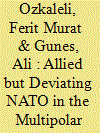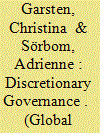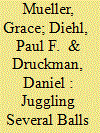|
|
|
Sort Order |
|
|
|
Items / Page
|
|
|
|
|
|
|
| Srl | Item |
| 1 |
ID:
184667


|
|
|
|
|
| Summary/Abstract |
“How long can NATO last in a post-US hegemonic, multipolar world?” has become an important question in contemporary world politics. By statistically analyzing NATO alliance cohesion since its inception, this analysis contributes to the literature by developing an original set of indicators that rely on the ideal point estimates from a recent UN General Assembly voting dataset. It empirically verifies that NATO members have higher cohesion than other UN members, although the United States has been the most significant deviating member since 1980. The findings support some earlier proposals such as the external threat hypothesis. They also contradict some others, notably the literature on the Donald Trump administration’s withdrawal doctrine, and the decline of US hegemony and its policy implications. The article concludes that the future challenge for NATO cohesion not only would be the possibility of US abdication or abandonment, but also other members’ balancing the United States as the hegemon.
|
|
|
|
|
|
|
|
|
|
|
|
|
|
|
|
| 2 |
ID:
184666


|
|
|
|
|
| Summary/Abstract |
Built on the exclusive funding of 1,000 large transnational corporations, the World Economic Forum is a not-for-profit Swiss foundation, aiming to shape the direction of globalization. Its events are characterized by low degrees of formality and transparency. Research on what this organization does is scarce. This article suggests the term discretionary governance to capture the precarious, yet existing, social order that the organization shapes. By discretionary governance, we mean a set of discreet practices based on the organization’s judgement in ways that escape established democratic controls. Drawing on ethnographic data the paper demonstrates how selection, secrecy, and status form key components of this tenuous ordering. Selection processes and secrecy contribute to status elevation of the individuals and organizations chosen to participate. Upon them and the organization itself is bestowed a symbolic capital that is practical and possibly profitable in the world of global governance.
|
|
|
|
|
|
|
|
|
|
|
|
|
|
|
|
| 3 |
ID:
184665


|
|
|
|
|
| Summary/Abstract |
Like other normative systems, the international nuclear export control norms are incomplete and at times contradictory. Thus, contestations to the international nuclear export control norms inevitably emerge, as they did in the wake of the 1974 Indian nuclear test and the 1991 discovery of Iraq’s nuclear weapons program. These two nuclear crises prompted intense debates regarding the adequacy of the existing norms. The outcome of the debates generated overwhelming agreement and action among nuclear suppliers that they required strengthening. Drawing on Wayne Sandholtz’s theory of normative change, which argues that events trigger disputes whose outcomes modify norms, this article illustrates how the nuclear export control norms have evolved in a cyclical fashion. The article aims to contribute to the constructivist literature on normative change and discusses policy implications.
|
|
|
|
|
|
|
|
|
|
|
|
|
|
|
|
| 4 |
ID:
184668


|
|
|
|
|
| Summary/Abstract |
Intergovernmental, regional, and international organizations play an active role in the governance of transnational crises. In the context of the COVID-19 pandemic in Latin America, the World Health Organization and the Pan-American Health Organization have been linked with multiple actors and levels of decision-making, putting into practice what the literature on global governance refers to as indirect governance by orchestration. This article shows that, in practice, the mechanisms of orchestration have established heterogeneous models of coordination and action that, in situations of transnational crisis, allow these organizations to bring together resources, capacities, and authority.
|
|
|
|
|
|
|
|
|
|
|
|
|
|
|
|
| 5 |
ID:
184664


|
|
|
|
|
| Summary/Abstract |
Peacekeeping during the Cold War was primarily, and in some cases exclusively, charged with monitoring cease-fires. This changed significantly, as peace operations evolved to include other missions (e.g., rule of law, election supervision), many under the rubric of peacebuilding. What is lacking is consideration of how the different missions affect one another, simultaneously and in sequences. This study addresses that gap by looking at the interconnectedness of missions and their success in the UN Organization Mission in the Democratic Republic of the Congo (MONUC), which was mandated to perform eight different missions over a decade. The article examines success or failure in each of those missions and how they relate to one another guided by theoretical logics based on the “security first” hypothesis and mission compatibility expectations. Early failure to stem the violence had negative downstream consequences for later peacebuilding missions. Nevertheless, MONUC’s election supervision mission was successful.
|
|
|
|
|
|
|
|
|
|
|
|
|
|
|
|
| 6 |
ID:
184663


|
|
|
|
|
| Summary/Abstract |
On 20 September 2021, a Rwandan court sentenced Paul Rusesabagina—the hotelier immortalized in the film, Hotel Rwanda, for his role is saving hundreds of Tutsi from genocide in 1994—to twenty-five years in prison on terrorism charges. His daughter, Carine Kanimba, has campaigned against his detention, maintaining his innocence throughout the trial and conviction. By early 2021, the Paul Kagame government allegedly placed Kanimba under digital surveillance.1 Her iPhone was infected with spyware known as Pegasus, the product of an Israeli firm, NSO Group. The intrusion enabled monitoring of her calls, tracking of her
|
|
|
|
|
|
|
|
|
|
|
|
|
|
|
|
|
|
|
|
|